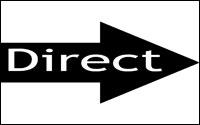 When it comes to the advertising
industry, and especially in the programmatic space, there's a whole lot of BS tossed around about who can do what, when, and where. Personally, I have a hard time remembering off the top of my head
what company does what, mostly because everyone seems to say they can do everything. One week a company is a "cloud-based ad solutions provider," the next they are a mobile exchange.
When it comes to the advertising
industry, and especially in the programmatic space, there's a whole lot of BS tossed around about who can do what, when, and where. Personally, I have a hard time remembering off the top of my head
what company does what, mostly because everyone seems to say they can do everything. One week a company is a "cloud-based ad solutions provider," the next they are a mobile exchange.
Sifting through the pile of BS, though, one term sticks out - "direct."
In the automated space, we often hear the term "programmatic direct." We hear about how real-time
bidding (RTB) has a low ceiling because it's associated with remnant inventory, and that programmatic direct is how the cool kids trade. I was at Tech For Direct last week where speakers happily
displayed charts showing that programmatic direct would bring in piles of cash to the moon and back, sucking the money from RTB's measly spend predictions.
One problem
though…it seems to me that everyone trying to sell the idea of programmatic direct is actually a middle man.
I'm not saying the idea behind an easier way for brands and
publishers to collaborate is bad. Not at all. It just feels as though "programmatic direct" options are nothing more than rebranded demand-side platforms or sell-side platforms. The term "direct" is
inviting because it carries with it the old school way of doing things while avoiding the stigma of "remnant." But then what do we call sales that are actually direct?
I spoke
yesterday with Mark Trefgarne, CEO of LiveRail, about his company's recent Video Publisher Forum. The term popped up a few times during the event, and he said the he objects to it being called direct
because, well, it's not direct.
So what does Trefgarne think really qualifies as programmatic direct? "A direct deal that is executed programmatically," he said.
Oh. It can be that simple?